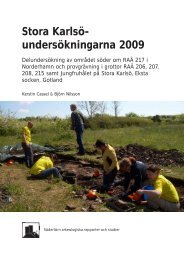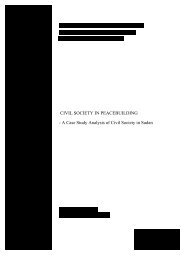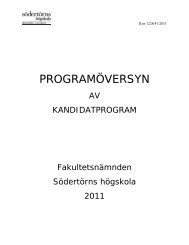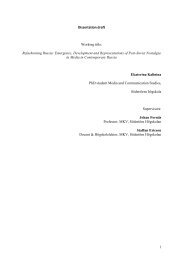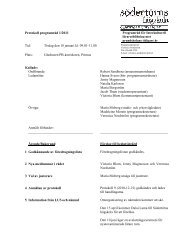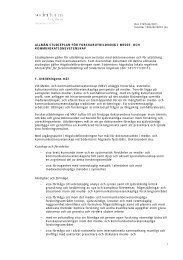Underlying Reasons for the Persistence of Female Genital Mutilation
Underlying Reasons for the Persistence of Female Genital Mutilation
Underlying Reasons for the Persistence of Female Genital Mutilation
Create successful ePaper yourself
Turn your PDF publications into a flip-book with our unique Google optimized e-Paper software.
difficult to conduct a replication since <strong>the</strong> researcher is <strong>the</strong> one deciding on what to concentrate<br />
on from what is observed or heard 23 , which in that case affects <strong>the</strong> works reliability. Ano<strong>the</strong>r<br />
issue <strong>of</strong> criticism comes from <strong>the</strong> problem <strong>of</strong> generalization. The issue is focused on when <strong>the</strong><br />
qualitative methods are used in <strong>for</strong>m <strong>of</strong> participant observation, or when unstructured interviews<br />
are conducted with a small group <strong>of</strong> individuals in a certain area, it is argued that it is impossible<br />
to know how <strong>the</strong> findings can be generalized to o<strong>the</strong>r settings 24 . However in this case study<br />
research, as it <strong>of</strong>ten is in a case study, <strong>the</strong> sample drawn is not representative <strong>of</strong> a whole<br />
population. Ra<strong>the</strong>r it is <strong>the</strong> quality <strong>of</strong> <strong>the</strong> chosen <strong>the</strong>oretical influence <strong>of</strong> <strong>the</strong> developed<br />
qualitative data that is crucial to <strong>the</strong> opinion <strong>of</strong> generalization.<br />
2.2 Material collection methods and in<strong>for</strong>mants <br />
There are certain difficulties when writing about FGM. The findings <strong>of</strong> literature and facts that<br />
oppose to <strong>the</strong> subject are easy to come across because <strong>of</strong> <strong>the</strong> well established and widely spread<br />
movement against FGM. There<strong>for</strong>e searching <strong>for</strong> sources giving reasons that justify FGM is<br />
harder to come across. Given this, <strong>the</strong> <strong>the</strong>oretical frameworks will function as guidance through<br />
<strong>the</strong> empirical findings when analyzing what <strong>the</strong> purpose <strong>of</strong> this study is; <strong>the</strong> persistence <strong>of</strong> FGM.<br />
The interviews were conducted through semi-structured interviews with in<strong>for</strong>mants from<br />
different groups <strong>of</strong> people; a volunteer from AFNET (Anti <strong>Female</strong> <strong>Genital</strong> <strong>Mutilation</strong> Network),<br />
a local NGO in Babati, and separate group interviews with men and women from two different<br />
villages. According to AFNET <strong>the</strong>se villages used to practice FGM, but since AFNET<br />
contributed with education about <strong>the</strong> harmful consequences <strong>the</strong> practice has declined. As <strong>the</strong>se<br />
interviews were contributing to <strong>the</strong> study, one main issue was still to be explored; <strong>the</strong> problem<br />
with FGM still existing. An interview in an area where FGM still occurred was hard to locate<br />
since AFNET had well-established connections in areas where <strong>the</strong>y used to operate and where<br />
<strong>the</strong> practice has already been ceased. I did not get <strong>the</strong> opportunity to visit a village where this<br />
problem still occurred, which I was highly anticipating on doing. I am aware that could have<br />
increased my understanding <strong>of</strong> what <strong>the</strong> problem was in <strong>the</strong> particular area. However,<br />
interviewing an elderly woman that traditionally used to circumcise girls called Ngariba, and a<br />
23 Bryman Social Research Methods, p. 391 <br />
24 Ibid <br />
10



